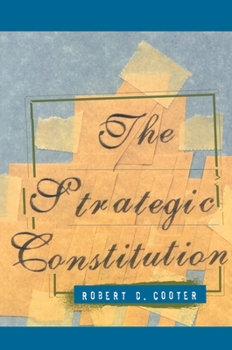The Strategic Constitution
Select Format
Select Condition 
Book Overview
Making, amending, and interpreting constitutions is a political game that can yield widespread suffering or secure a nation's liberty and prosperity. Given these high stakes, Robert Cooter argues that constitutional theory should trouble itself less with literary analysis and arguments over founders' intentions and focus much more on the real-world consequences of various constitutional provisions and choices. Pooling the best available theories from economics and political science, particularly those developed from game theory, Cooter's economic analysis of constitutions fundamentally recasts a field of growing interest and dramatic international importance.
By uncovering the constitutional incentives that influence citizens, politicians, administrators, and judges, Cooter exposes fault lines in alternative forms of democracy: unitary versus federal states, deep administration versus many elections, parliamentary versus presidential systems, unicameral versus bicameral legislatures, common versus civil law, and liberty versus equality rights. Cooter applies an efficiency test to these alternatives, asking how far they satisfy the preferences of citizens for laws and public goods. To answer Cooter contrasts two types of democracy, which he defines as competitive government. The center of the political spectrum defeats the extremes in "median democracy," whereas representatives of all the citizens bargain over laws and public goods in "bargain democracy." Bargaining can realize all the gains from political trades, or bargaining can collapse into an unstable contest of redistribution. States plagued by instability and contests over redistribution should move towards median democracy by increasing transaction costs and reducing the power of the extremes. Specifically, promoting median versus bargain democracy involves promoting winner-take-all elections versus proportional representation, two parties versus multiple parties, referenda versus representative democracy, and special governments versus comprehensive governments. This innovative theory will have ramifications felt across national and disciplinary borders, and will be debated by a large audience, including the growing pool of economists interested in how law and politics shape economic policy, political scientists using game theory or specializing in constitutional law, and academic lawyers. The approach will also garner attention from students of political science, law, and economics, as well as policy makers working in and with new democracies where constitutions are being written and refined.Format:Paperback
Language:English
ISBN:0691096201
ISBN13:9780691096209
Release Date:April 2002
Publisher:Princeton University Press
Length:440 Pages
Weight:1.20 lbs.
Dimensions:1.1" x 6.1" x 9.2"
Customer Reviews
2 ratings
Very useful synopsis of key themes
Published by Thriftbooks.com User , 21 years ago
If economic analysis of law had developed in continental Europe it would probably have begun with Constitutional law, rather than torts (Cf. Calabresi, the Cost of Accidents). As it was, the body of economic analysis of constitutional law is just starting to come together from a variety of sources, including public choice theory. Cooter came up with the idea for this book by way of discussions with European constitutional law experts. The book has all the merits of Cooter & Ulen's "Law and Economics". It is very easy to follow because it has been clearly written. It is not as deep, but neither is it as verbose as Posner, nor as insightful, or as superficial, as Sunstein. As a law and economics professor I have found it a Godsend. Its many examples and exercises make it a perfect undegraduate textbook, and it is high time it were translated into other languages (particularly Spanish, where there is no equivalent contemporary text). One would hope that Cooter would follow it up with a casebook with American and European cases. This is still a white space, and there's no one better qualified than Cooter to fill it up.One caveat is that The Stratetic Constitution still shows the joints between some of the chapters and the greater whole, and there seem to be other subjects which could have been dealt with in greater detail, such as the impact of positive constitutional rights, which is significant in many countries whose systems are based on statutory law.
Constitutional Law and Economics
Published by Thriftbooks.com User , 22 years ago
Well written, simple and complete. If I wasn't aware of the existing public choice literature I would have thought that this branch of economics (or law?) is mature and well developed, and that this book is a University textbook for a would-be course in Constitutional law and economics (if ever tought). However, this field is still fresh and unchartered, and this book gives a good idea of what to expect next.






